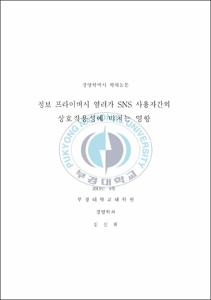정보 프라이버시 염려가 SNS 사용자간의 상호작용성에 미치는 영향
- Abstract
- The purpose of this study is to identify user's behaviors of social network services(SNS) at an user's level. This study decides variables such as information privacy concern, information privacy risk, information privacy protective response, and interaction among SNS users and tries to find how variables affect each other. To do this, this study designed a new research model for the purpose and performed survey, focusing on SNS users who are over twenty years old. Total 272 responses have been analyzed. The findings are as followed:
First, collection and awareness of information privacy concern have positive effects on information privacy protective response. In other words, users always aware uncertainty or risk that their personal information may be abused.
Second, collection and control of information privacy concern have positive effects on information privacy risks. This result indicates that the power to manage user's personal information and influence of control still belong to a SNS company, rather than users.
Third, information privacy risks have positive effects on information privacy protective response. It means that users take direct and indirect protective actions to protect personal information when they aware that there are privacy exposure risks.
Fourth, information privacy risks and information privacy protective response have negative effects on interaction among users. There is less interaction among users who show higher tendency to protect their personal information.
Fifth, collection and control of information privacy concern have negative effects on interaction among users. People who have higher tendency to protect their personal information makes less participation in interaction among users.
Based on the results of this empirical study, protection measures for users information can be proposed at an individual level as below.
First, SNS users should be more prudent when making open their information. Over the SNS, people voluntarily make open their personal information to build a sense of fellowship, a sense of kinship and a sense of intimacy with other people so that they may have their social desires satisfied. However, they should realize that not only personal identification information they enter when joining SNS, such as their names and addresses, but also various other kinds of information they post for themselves can be their personal information. Accordingly, they should recognize they make responsible choices during the process of making open their personal information, and they should be more careful to make prudent and rational choices.
Second, SNS users should respect other people's personal information. Since SNS users are basically personal information providers, but they also read other people's personal information, every single individual can be either a personal information collector or a personal information infringer. Therefore, it is required to make a code of ethics for SNS users to realize that searching and leaking other people's personal information is a social behavior absolutely different from building a bond of sympathy with other people with the same tastes by acquiring information about their tastes and interest. Moreover, as SNS features in making open a great deal of personal information about individuals' tastes and interest, SNS users should recognize there always exists a risk of infringing other people's privacy over the SNS.
Key Word: information privacy concern, information privacy risk, information privacy protective response, interaction among users
- Issued Date
- 2013
- Awarded Date
- 2013. 8
- Type
- Dissertation
- Publisher
- 부경대학교
- Affiliation
- 대학원
- Department
- 대학원 경영학과
- Advisor
- 김하균
- Table Of Contents
- 제1장 서 론 1
제1절 연구의 배경 1
제2절 연구의 목적 3
제3절 연구의 방법 및 구성 4
제2장 이론적 배경 7
제1절 SNS(Social Network Service) 7
1. SNS의 개념 7
2. SNS의 특성 9
3. SNS 환경에서 프라이버시 개념의 변화 11
제2절 정보 프라이버시 염려 13
1. 정보 프라이버시에 대한 염려 13
2. 정보 프라이버시 염려의 측정모델 16
제3절 정보 프라이버시 위험 20
1. 지각된 위험과 관련된 정보 프라이버시 위험 20
2. 온라인 환경에서의 정보 프라이버시 위험 23
제4절 정보 프라이버시 보호반응 25
1. 불평행동과 관련된 정보 프라이버시 보호반응 25
2. 정보 프라이버시 보호반응 측정모델 27
제5절 사용자간 상호작용성 32
1. 온라인 환경에서의 상호작용성 32
2. 온라인 커뮤니티에서의 상호작용성 유형 34
3. 사용자-사용자 상호작용성 35
제3장 조사 및 분석방법의 설계 41
제1절 연구모형 41
제2절 연구가설의 설정 42
1. 정보 프라이버시 염려와 정보 프라이버시 위험과의 관계 42
2. 정보 프라이버시 염려와 정보 프라이버시 보호반응과의 관계 44
3. 정보 프라이버시 위험과 정보 프라이버시 보호반응과의 관계 47
4. 정보 프라이버시 위험과 사용자간 상호작용성의 관계 48
5. 정보 프라이버시 보호반응과 사용자간 상호작용성의 관계 49
6. 정보 프라이버시 염려와 사용자간 상호작용성의 관계 51
제3절 변수의 조작적 정의 53
1. 정보 프라이버시 염려 54
2. 정보 프라이버시 위험 54
3. 정보 프라이버시 보호반응 55
4. 사용자간 상호작용성 55
제4절 설문지 구성 및 자료수집 방법 56
1. 조사표본의 설계 56
2. 설문지의 구성 57
제4장 실증연구의 분석 결과 58
제1절 기초통계 분석결과 58
1. 표본의 특성 58
2. 신뢰성 및 타당성 분석 결과 61
3. 확인적 요인분석 결과 63
4. 상관관계분석 결과 65
제2절 가설검증 결과 66
1. 연구모형의 적합도 분석결과 66
2. 연구가설 검증결과 71
제3절 분석결과의 요약 78
제5장 결론 81
제1절 연구결과의 요약 및 시사점 81
1. 개인정보 보호방안 81
2. 연구의 시사점 84
제2절 연구의 한계 및 향후 연구방향 85
86
설문지 100
- Degree
- Doctor
- Files in This Item:
-
-
Download
 정보 프라이버시 염려가 SNS 사용자간의 상호작용성에 미치는 영향.pdf
기타 데이터 / 1.03 MB / Adobe PDF
정보 프라이버시 염려가 SNS 사용자간의 상호작용성에 미치는 영향.pdf
기타 데이터 / 1.03 MB / Adobe PDF
-
Items in Repository are protected by copyright, with all rights reserved, unless otherwise indicated.